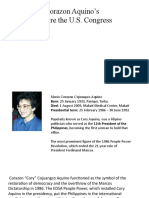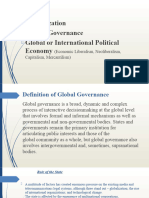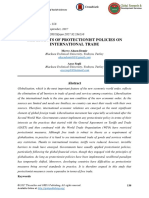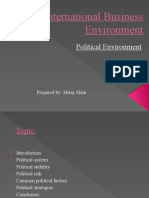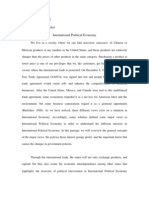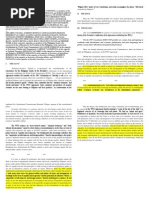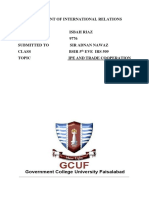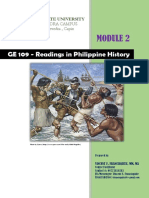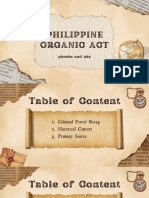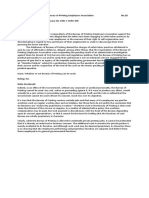Letures On Anti Dummy
Letures On Anti Dummy
Uploaded by
mica43826Copyright:
Available Formats
Letures On Anti Dummy
Letures On Anti Dummy
Uploaded by
mica43826Original Description:
Original Title
Copyright
Available Formats
Share this document
Did you find this document useful?
Is this content inappropriate?
Copyright:
Available Formats
Letures On Anti Dummy
Letures On Anti Dummy
Uploaded by
mica43826Copyright:
Available Formats
The Politics of the Anti-Dumping Law of the Philippines 1
Bing Baltazar C. Brillo2
Brilo, B.B. (2010). The Politics of the Anti-Dumping Law of the Philippines. UPLB Journal, vol.
8, no. 1, pp. 17-29.
Keywords
Anti-Dumping, GATT-WTO, Policymaking,
Republic Act 7843, Republic Act 8752
Abstract
As a member of the World Trade Organization (WTO) and signatory to the General
Agreement on Tariffs and Trade-Uruguay Round (GATT-UR) Agreement, the Philippines has
become a member of the international trade regime. The economic regime promotes the
unhampered flow of goods and impels the country to open its economy to foreign goods. This
scenario poses a risk to the local industry as foreign competitors, in their quest to penetrate and
capture markets, can engage in dumping. To mitigate the risk inherent in the situation, the GATT-
WTO regime encouraged countries to legislate an anti-dumping law. The rationale of the law is
to establish a system of international trading where the playing field is even or level for all
players. The anti-dumping law gives a country the right to adopt an adequate response to protect
itself against unfair trade practices of other countries. This paper is about the evolution of the
anti-dumping law in the Philippines, specifically the enactment of Republic Act (R.A.) 7843, and
the transition to R.A. 8752. It concludes with the following observation on the policymaking
experience: first, the enactment shows the satisficing nature and the protective tendency of the
lawmakers; second, the enactment reveals the increasing influence and relevance of
international organizations and regimes in domestic policymaking; and lastly, the evolution of
the policy illustrates the dynamics of interagency competition vis-à-vis policy change.
Introduction
As a member of the World Trade Organization (WTO) since January 1, 1995, and as a
signatory to the General Agreement on Tariffs and Trade-Uruguay Round (GATT-UR)
Agreement, the Philippines has become a member of the international economic order,
1The author wishes to thank the anonymous reviewers, but assumes full responsibility for the
final manuscript.
2 The author is Assistant Professor at the Department of Social Sciences, University of the
Philippines Los Baños, and is pursuing the PhD in Development Studies (by Research) at De La Salle
University.
Electronic copy available at: https://ssrn.com/abstract=1925219
particularly in the area of international trade. The economic regime promotes the unhampered
flow of goods and impels the country to open its economy, including industrial and agricultural
markets, to foreign goods. The availability of imported goods in the domestic market results in
stiff competition between the local and the foreign producers and manufacturers. This scenario
poses a risk to the local industry as, foreign competitors, in their quest to penetrate the market
and capture market share, can engage in unscrupulous practices, such as dumping.
Dumping as defined by the Tariff Commission (TC) “occurs when foreign producers sell
their products to an importer in the domestic market at prices lower than in their own national
markets, or at prices below cost of production, the sale or importation of which injures or
threatens to injure a domestic industry producing like or comparable products or retards the
establishment of a potential industry. It is a form of price discrimination between two national
markets.” Dumping exists when key elements such as the following are present: (a) importation
below the normal value, (b) material injury or threat of material injury to the domestic industry,
and (c) a causal link between the injury and the importation. The high possibility of dumping in
the domestic market poses a clear and present danger to the local industries.
To remedy the situation, countries are encouraged to legislate an anti-dumping law. Anti-
dumping is a principle well recognized in international trade, as even the GATT-WTO regime
requires member countries to enact the law (see Article 6 of GATT 1994). The rationale for the
law is to establish a system of international trading where the playing field is even or level. The
anti-dumping law gives a country the right to adopt an adequate response to protect itself against
unfair trade practices of other countries. For instance, the law can impose a duty or tariff to even
up the pricing mechanism between domestically produced goods and like products that are
considered dumped products.
In the Philippines, a dumping law incorporated in Republic Act (R.A.) 1937, the Tariff
and Customs Code, had been in existence since 1957. It dealt mainly with the imposition of
dumping duty, and was considered inadequate in coping with the problem of dumping in the era
of an open economic system. Following the mandate of the GATT-WTO regime, in 1993 the
Ramos administration and the Ninth Congress agreed to repeal the existing dumping law. The
intention of the policy actors was more to put up an infrastructure and support system necessary
to protect the domestic industry rather than to diligently adhere to the GATT-WTO principles on
anti-dumping practices. The effort resulted in R.A. 7843.
As R.A. 7843 was not entirely consistent with the GATT-WTO Agreement, in 1998 the
Estrada administration and the Eleventh Congress took action to amend the prevailing anti-
dumping law. This time the intention was primarily to comply fully with the mandate of the
international agreement. The effort produced R.A. 8752. This paper is about the politics of the
evolution of the anti-dumping law in the Philippines, specifically the enactment of R.A. 7843,
and the transition to R.A. 8752. The study focuses on how each policy came about.
Electronic copy available at: https://ssrn.com/abstract=1925219
Factors of Policymaking
Policy is considered the essence of governance, as it is the concrete manifestation of
government actions to address public issues, needs, or concerns. Policies, broadly described as
“anything a government chooses to do or not to do” (Dye 1972: 2), often take the form of laws,
statutes, regulations, or measures. The description implies that policymaking is a governmental
activity where policy actors make formal decisions by enacting policies. Policymaking usually
consists of agenda setting, discussion, formulation, and approval of the policy (Stein et al 2005,
Lester and Stewart 2002, Howlett and Ramesh 1995), where each stage of the process involves
interaction among policy actors.
Once made, a policy becomes a binding rule that regulates the actions of people and
society. An existing policy continues to be enforceable until amended, changed, or revoked by
legitimate authority through a legislative fiat. In some cases, the continuity of a policy is
measured by its utility (Heywood 2002; e.g., see discussions on rationality model [Downs 1957]
and on bounded rationality [Simon 1983]). The rule of thumb is that a policy persists as long as it
is useful and relevant. In other cases, the demand for policy change may be set off from the
outside (e.g., see discussions on lesson drawing [Rose 1991] and on policy transfer [Dolowitz
and Marsh 2000]) by changing international condition, which can render existing policies
unresponsive or obsolete. This mode has become pronounced in the era of economic
globalization where international regimes have become regular and influential in policymaking,
thereby making the process more susceptible to external pressures. One prominent manner of
promoting policies from the outside is through “policy transfer” 3 where policies from other
countries are either adopted voluntarily by the host country or coercively imposed on it by a
government or an international institution (Dolowitz and Marsh 1996).
The process of crafting or repealing a policy requires engagement of political actors
(institutional, societal, or international actors). As the actors represent different interests, and
each one tries to exert influence to shape the policy, the policymaking is essentially a political
game. Analyzing the politics of the policy process requires the examination of the fundamental
factors that contribute to policymaking (Reich 2002).
The first factor is the context, which refers to the surrounding conditions behind the move
on the policy. In particular, the context pertains to the domestic and international political,
economic, and social setting where the policymaking process takes place (Birkland 2001). The
environment can obstruct or facilitate the mobilization of demand for the policy, as varying
conditions can create incentives for the policy actors to take action. The context exemplifies the
3Dolowitz and Marsh (2000) defined policy transfer broadly as “the process by which
knowledge of policies, administrative arrangements, institutions and ideas in one political system (past
or present) is used in the development of policies, administrative arrangements, institutions and ideas
in another political system.
Electronic copy available at: https://ssrn.com/abstract=1925219
importance of changing conditions, as it can provide an ideal backdrop for setting the agenda of
the policy.
The second is the stakeholders, or the parties involved in the policymaking. Stakeholders
are key political actors whose participation in the policymaking process is critical. They are
individuals, groups, or organizations that have vested interest in the policy being promoted
(Schmeer 1999). Stakeholders can be politicians, government agencies, private persons, or even
international organizations and regimes. Their interests should be taken into account, as they can
potentially affect the dynamics of the process. Stakeholders’ participation (support or opposition)
in pursuit of their interests lays down the landscape of the political arena for the proposed policy.
The third factor is rationalization, which refers to the arguments offered by policy actors
to justify the policy. For arguments to be compelling and credible, they must be logical, relevant,
and consistent with empirical evidence, and comprehensible to the public audience. The rationale
for a policy must offer a plausible solution to a problem, issue, or concern. More importantly, it
must be able to project the message that the policy serves the public well-being as well as
demonstrate that the advantages of the policy far outweigh the disadvantages.
In a democratic political system, policy proposals go through an institutionalized
policymaking process, where stakeholders are guaranteed a voice and platform to contest, and
policy decisions are made through a vote of lawmakers. Careful evaluation of the factors leads to
a better understanding of the intricacies of the dynamics of the evolution of the Anti-Dumping
Law.
Republic Act 7843
The Context and Stakeholders
Since the formation of GATT in 1947 and its eventual replacement under the Uruguay
Round by WTO in 1995, the postwar international trade has been delineated by the GATT-WTO
regime. The global trade regime was anchored on liberalization as countries were encouraged to
promote the unhampered flow of goods by opening their economies and markets. The regime’s
principal aim was to remove the major impediments to international trade (Cohn 2008). This
practice was put in operation by obliging countries to lower their tariffs and duties on traded
goods. This liberalized arrangement, which in general does not put any limitation on imports,
immensely increased the volume of the global exchanges of goods.
After winning a close election in the Philippines in 1992, President Fidel V. Ramos
launched an ambitious economic reform program anchored on economic liberalization. In trade,
the Ramos administration embraced the prevailing GATT-based global trade regime. To
synchronize its program with the international trade regime, the Government started
implementing liberalized policies, such as deregulation, privatization, and opening up to foreign
Electronic copy available at: https://ssrn.com/abstract=1925219
investments; and enlisted the country with the GATT-UR Agreement (De Dios and Hutchroft
2003).
Anticipating Senate ratification of the GATT-UR Agreement in the later part of 1994
(following the Constitutional requirement that the Senate needs to ratify an international treaty
entered into by the Philippine Government), interested parties appealed to the Government to
take action to provide safety nets for the local industry. The apprehension was premised on the
drastic reduction of tariffs on imports, which would result in the influx of imported goods to the
country. Considering that many imported goods are cheaper than locally produced goods, the
domestic economy, particularly the industrial and agricultural sectors, could be severely affected.
If an enterprise could not adjust, then it would not survive foreign competition, and business
closures and mass unemployment would result.
In principle, the vulnerability of local businesses against foreign competitors is
acceptable in an environment of fair competition. As an open economic system, however, the
GATT regime is prone to the practice of dumping. Dumping per se is not bad as flooding the
market with cheap imported goods benefits consumers and forces local manufacturers to review
their costing and be efficient. But when predatory pricing4 is employed to penetrate the market
and competition is eliminated and deliberately destroyed to gain a market share— deceitfully
putting the local producer out of business— then the practice is unacceptable. The likelihood of
the prevalence of this practice after the adoption of the GATT-UR Agreement and the perceived
inadequacy of the existing anti-dumping law in safeguarding local industries from unfair foreign
competition fueled the move to repeal R.A. 1937, in particular, Section 301 Part 2, Title II, Book
I of the Tariff and Custom Code.
The executive agencies at the forefront of the effort to repeal the anti-dumping law were
the Department of Finance (DOF), the Department of Trade and Industry (DTI), the Bureau of
Customs (BOC), and the National Tax Research Center (NTRC). The Government agencies were
amply supported by the main business umbrella group— the Philippine Chamber of Commerce
and Industry (PCCI). As the interest of its members was on the line, the PCCI collaborated with
the agencies in preparing the draft of the repealing law. The draft became the template of the bills
filed by the lawmakers in Congress.
To summarize, the Ninth Congress opened the committee hearings on 16 March 1993 in
the Senate. Senate Bills no. 284, 357, and 1905 were heard by the Committee on Ways and
Means, chaired by Senator Ernesto Herrera. In the House of Representatives, the committee
hearings on House Bills no. 658, 4626, 13862, and 14096 started on 8 October 1992 in the
Committee on Trade and Industry, chaired by Representative Roilo Golez, and on 16 November
1994 in the Committee on Ways and Means, chaired by Representative Exequiel Javier. Pursuant
to the provisions of Section 26, paragraph 2 of Article VI of the Constitution, President F. Ramos
4Predatory pricing is the practice of pricing goods below cost and incurring a loss in order to
reduce or eliminate competition (http://dictionary.reference.com/browse/predatory+pricing).
Electronic copy available at: https://ssrn.com/abstract=1925219
certified the anti-dumping bill as urgent in both chambers on 22 November 1994. The Senate
hearings yielded Committee Report no. 713 on Senate Bill 357, which was approved on Second
and Third Reading on 12 December 1994. The House hearings resulted in Committee Report no.
972 on House Bill 14177, which was approved on Second Reading on 23 November 1994 and on
Third Reading on 29 November 1994. The bills were reconciled and approved by the Bicameral
Conference Committee on 14 December, and ratified by the Senate and the House on 19
December 1994. The new anti-dumping law was formally signed by President F. Ramos on 21
December 1994, and became R.A. 7843.
The Rationale for Republic Act 7843
Early on in the Congressional deliberations, the weakness of the existing dumping law in
R.A. 1937 became apparent. During the committee hearings, Senator E. Herrera revealed that
“during the ten-year period from 1977 to 1987, 41 dumping cases were filed, 30 of these were
dismissed by the Tariff Commission, and only one case got a positive finding from the
Department of Finance.” The implication was that in its present form the anti-dumping law as a
defensive or relief mechanism was seemingly not working. Worse, the weakness of the
application of the law was expected to be further aggravated with the implementation of the
GATT-UR Agreement. As the anti-dumping law was already wanting in the current economic
setup, certainly, the law would be more ineffectual in the transition to an open economic system.
Overall, the move to repeal the law had two objectives— the first was to craft a law that
abides by the GATT-UR Agreement, and the second was to preempt the consequences of the said
international agreement. As there was the possibility that the two objectives may not harmonize
on all aspects, the dilemma of the legislators was how to balance them by crafting a law that
adheres to the principles of GATT and at the same time provides enough leeway for the
government to shield the local industry against aftereffects.
In the case of a conflict between the two objectives, the prevailing sentiment among the
lawmakers was to give precedence to the latter. The repeal process was considered more as an
expression of commitment to the local industry, in particular to the agricultural and industrial
sectors, than compliance with the commitment to the international agreement. Senator Gloria
Arroyo, a co-sponsor of the anti-dumping bill, contended that the primary purpose in repealing
the law was to set up a safety net to help the local industry cope with the changes brought about
by the GATT regime, and secondarily to align with the GATT mandate. The argument was
anchored on the assessment that the concern for the protection of the domestic industry was
immediate, while governments usually had at least five years to comply with the GATT
requirements on anti-dumping.
The intent of the legislators was to quickly enact an anti-dumping law tilted toward the
domestic industry before the formal ratification of the GATT-UR Agreement, and to amend the
law again after several years to make it consistent with the commitments to GATT. As Senator
Electronic copy available at: https://ssrn.com/abstract=1925219
Orlando Mercado stated, “while we will ultimately need to harmonize our anti-dumping law with
the relevant provisions of the GATT-Uruguay Round should we ratify the treaty, that process of
compliance may take a while.” The strategy was for the Government to buy time to enable the
local industry to make the necessary adjustments and preparation against foreign competition.
As to the content of the anti-dumping bill, there were two main issues in the amendment:
one was the issue of jurisdiction over anti-dumping cases, and the other was the bond
requirement. The first issue was basically whether dumping was a trade or fiscal concern. If it
was primarily a fiscal concern, then the Secretary of Finance would have responsibility over the
cases and the provision in R.A. 1937 would be retained. If it was principally a trade concern,
then the Secretary of DTI would have jurisdiction and the provision in R.A. 1937 must be
changed. The proponents on the side of DTI argued that the law was first and foremost intended
to protect local industry; hence, it was clearly within the domain of the agency. Second, the DTI
was in a better position to determine the condition of an industry, particularly when ascertaining
unfair competition or injury caused by dumping, as the agency would have better information,
logistics, facilities, network, and expertise. This position was fervently supported by the senators,
particularly by Senator G. Arroyo who was a former undersecretary of DTI.
On the other hand, the proponents on the side of DOF argued that although DTI might
have some advantages, still the violations in dumping cases were fundamentally a fiscal matter.
Second, the institutional and functional bias of DTI, which is the promotion of domestic industry,
may create doubt in the objectivity of its decision. In addition, by giving the jurisdiction to DTI,
there was a danger that other countries might interpret the move as blatant protectionism for the
local industry; hence, it might invite retaliatory measures against Philippine exports. DOF
maintained that they had the advantage of being perceived as a more neutral body in deciding
dumping cases and that there was no sufficient or cogent reason for the transfer. This position
was defended by the members of the House. For instance, Representative E. Javier, arguing for
DOF in the Bicameral Conference deliberations, said: “we beg to disagree on the part of the
House because the imposition of dumping duty is a customs matter and therefore it should be the
Secretary of Finance.”
The second issue revolved around the proposal to impose a stiffer bond requirement for
the release of imported goods on which a dumping protest is filed. The proposal was to abandon
the practice of accepting a surety bond and to require a cash bond instead. The latter is deemed
more effective because it could deter importers from bringing in imports that may be the subject
of dumping cases and discourage unfair trade practices. Moreover, according to BOC, the cash
bond also prevents importers from absconding upon the release of their goods and provides
assurance that the government and the injured party could collect indemnity as well as the
dumping duty plus the correct amount of duties and taxes in case dumping was established.
Republic Act 8752
Electronic copy available at: https://ssrn.com/abstract=1925219
The Context and Stakeholders
In mid-1998, four years after the enactment of R.A.7843 and the affiliation to the GATT-
UR Agreement, calls were made to amend the prevailing anti-dumping law. Earlier in the Tenth
Congress, a bill had been filed to repeal the law, but the bill did not prosper because of lack of
time. In the Eleventh Congress, the move to amend R.A. 7843 was made, citing the need for the
country to sufficiently comply with the commitment under the GATT-WTO Agreement. It was
also noted that while preparing for the GATT-UR ratification, and in its bid to immediately
extend protection to the local industry, the Ninth Congress hurriedly passed the anti-dumping law
in 1994. As a consequence, the law lacked clarity and contained provisions inconsistent with the
GATT-WTO Agreement when it finally came into the picture.
After the Senate ratification of the GATT-UR Agreement and after the Philippines
became a full-fledged member of WTO, in principle the anti-dumping law embodied in the
international agreement became part of Philippine laws. The Government, as a signatory, needed
to comply with the treaty; otherwise, the country risked being criticized as well as being recipient
of complaints from the international economic body, other countries, and foreign businesses. For
instance, Commissioner Anthony Abad of the Tariff Commission (TC) warned that although in
principle our local laws take precedence over international laws, in cases of violation of the anti-
dumping agreement under WTO, an aggrieved contracting party that is a member of WTO has a
cause for action for dispute settlement at the international level. If there was no compliance with
the requirements of the international regime, the Dispute Settlement Board of WTO would
decide the case against the Philippines. To stave off the possibility of international disputes and
repercussions, the Estrada administration gave its full backing to the move to repeal R.A. 7843.
The move began when the executive agencies in the Legislative-Executive Development
Advisory Council (LEDAC) meeting identified repealing the anti-dumping law as a priority
measure. The government agencies leading the repeal process were DOF, DTI, BOC, TC,
Department of Agriculture (DA), and National Economic Development Authority (NEDA).
Except for DA and NEDA, the other government agencies were also the main participants in the
deliberations on R.A. 7843. As in the past, there were support and participation from the business
sector. Seeing that the interests of their members were again on the line, the main umbrella group
of the local businesses, such as PCCI and the Federation of Philippine Industries (FPI), actively
engaged in the policy deliberations.
PCCI and FPI tried to skew the crafting of the law to favor the preference of local
businesses. For instance, the President of FPI, Mr. Antonio Garcia, suggested transferring the
burden of proof to the importer rather than to the domestic company, as he pointed out the
difficulty of gathering the necessary data for domestic companies to establish proof in seeking
redress from the Anti-Dumping Law. He argued that “the biggest problem that many local
industries find in terms of determining [the] dumping, is the establishment of domestic price in
the country of origin,” as “the burden of proof is always on the domestic firm rather than the
importer.” Obviously, the proposal not only was biased for the local industry, but also was a
Electronic copy available at: https://ssrn.com/abstract=1925219
move to protect the industry by returning to the old arrangement. The proposal was untenable as
it contradicted the GATT-WTO mandate. As explained by Commissioner A. Abad, under WTO
the burden of proof was deliberately shifted to the local industry:
The problem of the dumping cases under the old Dumping Law prior to Uruguay Round
ratification was that the burden of proof used to be with the importer or the exporting
country to prove. In other words, imports are presumed guilty until proven innocent. So
there was an incentive on the part of lawyers involved in the case to just delay the case so
that the cash bond will stay in place. That’s why all this time, we’ve had long cases.
The legislators took offense at the FPI’s proposal, as they deemed such move as an
attempt to create an uneven playing field favoring local businesses and at the expense of
importers, foreign businesses, and Filipino consumers. In reprimanding the local business group,
Senator J. Enrile called on them to take responsibility and not to depend on the government for
protection all the time. He stressed that:
We are not adopting here a system of protectionism. We are willing to give some degree
of protection to our industries within the context of our treaty commitments and within
the context of what is considered for the national good.
Thus, the amendment must not only adopt a certain degree of fairness to all stakeholders, but
also embody the international commitment of the country.
To summarize, the Eleventh Congress opened the committee hearings on 14 August 1998
in the Senate and 2 March 1999 in the House of Representatives. Senate Bills no. 87, 763, and
765 were heard by the Committee on Ways and Means, chaired by Senator J. Enrile, and House
Bills no. 22, 553, 3283, and 5999 were heard jointly by the Committee on Trade and Industry,
chaired by Representative M. Punzalan, and the Committee on Ways and Means, chaired by
Representative H. Teves. The Senate hearings yielded Committee Report no. 1 on Senate Bill
763, which was approved on Second and Third Reading on 1 and 29 December 1998,
respectively. The House hearings resulted in Committee Report no. 319 on House Bill 7612,
which was approved on Second and Third Reading on 3 June 1999. The Bill was certified as
urgent in both chambers by President Joseph Estrada, pursuant to the provisions of Section 26,
paragraph 2 of Article VI of the Constitution. Senate Bill 763 and House Bill 7612 were
reconciled and approved by the Bicameral Conference Committee on 13 July, and ratified by the
Senate and the House on 15 July 1999. The new anti-dumping law was formally signed by
President J. Estrada on 12 August 1999, and became R.A. 8752.
The Rationale for Republic Act 8752
Overall, the intent in amending R.A. 7843 was to cure the perceived deficiency of the
anti-dumping law. The amendment addressed three basic concerns. The first was the need to
Electronic copy available at: https://ssrn.com/abstract=1925219
make the law adhere closely to the mandates in the GATT-UR WTO Agreement on Anti-
Dumping Practices. The issue was conformity, which was to align the domestic law with the
international treaty. The second was the need to redraft the text of the law to make it clearer,
logical, and simpler to implement. The issue was workability, which was to make the law easier
to carry out. And the third was the need to strengthen the rules governing the investigation of
anti-dumping cases. The issue was to toughen the anti-dumping mechanism against violators.
In the deliberations, DTI, NEDA, and TC admitted that the current form of the anti-
dumping law was not consistent with GATT-WTO. TC identified the following as inconsistent
provisions that needed to be revised:
• withholding of the release of questioned importation pending the determination of a
prima facie case of dumping;
• imposition of a provisional measure immediately upon the finding of a prima facie
case, effective up to the final determination of dumping;
• inclusion of substitutes in the definition of like products;
• country-specific application of anti-dumping duty;
• limiting to 10 days the period of submission of replies to a questionnaire; and
• retroactive application of definitive anti-dumping duty on all importations within 150
days immediately preceding the filing of the protest (see Committee Hearings in the
Senate and House of Representatives).
TC also admitted in the committee hearings that the Philippine Government had already made a
commitment to WTO that it would take action to amend the provisions.
In improving the workability of the anti-dumping law, the main problem raised was that
the current anti-dumping law was replete with vague provisions. Senator J. Enrile, the principal
sponsor of the amending bill, declared that “the purpose of this revision is to make the law
clearer. Republic Act 7843 appears to be rather cumbersome to implement and we [will try] to
make the proposed revision simpler and in accord with the provisions of existing treaty that we
have adhered to.” For instance, the law did not follow closely the technical terms used in the
agreement. Senator J. Enrile disclosed that in defining the injury that the domestic industry might
suffer, instead of using “threatening to cause material injury,” which is the globally accepted
term, the law used a very vague and untested phraseology—“which might injure, or retard the
establishment of, or is likely to injure an industry producing like articles.” As a consequence, the
purpose of the law, which was to provide protection to the domestic industry, was defeated by its
complexity. Thus, there was a need to simplify procedures and to establish common legal
provisions consistent with the internationally accepted terminology in the anti-dumping law.
In strengthening the anti-dumping mechanism, Senator J. Enrile identified two major
weaknesses of the current anti-dumping law. One was the severity of the burden of proof
required of the domestic industry in proving dumping. Thus, the amendment intended to ease the
burden of proof on the side of the domestic industry. The other weakness was the issue of venue
10
Electronic copy available at: https://ssrn.com/abstract=1925219
for the filing of a petition for dumping; R.A. 7843 allowed a petition to be filed either with the
Secretary of Finance or with the Secretary of Trade and Industry. The lawmakers questioned why
the Secretary of Finance came into the picture, when the said Secretary obviously had no
technical capability to determine the levels of production, pricing, markets, and the volume of
supply and demand. To address that weakness, it was proposed that cases involving industrial
goods should be handled by the Secretary of Trade and Industry, and those involving agricultural
goods should be handled by the Secretary of Agriculture.
Conclusion
The evolution of the anti-dumping law can be seen as part and parcel of the broader
government program to promote economic development. The post-EDSA Philippine
governments have climbed on the bandwagon of economic liberalism. Thus, in trade the main
strategy is to adopt an open economic system that promotes exchanges among countries. In line
with fully integrating economic policy with the international community, the Ramos
administration decided to participate in GATT and sign up with WTO. This course of action was
sustained and continued by the succeeding government, the Estrada administration. Under the
two administrations, the story of the evolution of the anti-dumping law from the original law—
from R.A. 1937 to the first amendment to R.A. 7843 and eventually to R.A. 8752— highlights
the following observation.
First, the enactment of R.A. 7843 shows the satisficing nature and the protective tendency
of the lawmakers, as they try to balance the country’s international commitment and their
inherent obligation to safeguard domestic interest. The satisficing nature pertains to the
legislators’ attitude of passing something just to comply with the international treaty, but without
really intending to fully comply with it; while the protective tendency refers to the preference of
the policy actors to skew the law in favor of the local industry. Both inclinations were manifested
in the amending process, as the primary consideration was to pass a law that would give more
time for the affected local businesses to adjust, rather than to candidly comply with the mandates
of the GATT-UR WTO Agreement. This disposition was shown when the legislators and the
executive agencies (e.g., DTI and DOF) worked in partnership with PCCI to craft an anti-
dumping law that would give more protection to the domestic industry. The display of strong
concern for the domestic industry that would be affected is understandable; as politicians,
lawmakers have the natural inclination to cultivate and not alienate local support. This approach
was reinforced by the existence of a time lag of several years for the Philippine government to
fully comply with the international agreement. In effect, R.A. 7843 was intended to be a
“temporary” law, which was expected to be amended later in the future.
Second, in contrast, the enactment of R.A. 8752 reveals the increasing influence and
relevance of international organizations and regimes in the domestic policymaking process,
specifically economic policymaking. The policymaking process was shaped from the outside, as
the policy actors’ primary concern was to enact an anti-dumping law consistent with the GATT-
11
Electronic copy available at: https://ssrn.com/abstract=1925219
UR WTO mandate. This disposition was shown when the legislators fended off attempts by
PCCI and FPI to skew the crafting of the law to unduly favor the preference of local businesses.
Thus, the lawmakers ultimately became less concerned with the interest of a particular sector—
domestic industry— and took a determined effort to ensure conformity to the law. The repeal
process was grounded on the acceptance by all the stakeholders of the inevitability of the
international agreement, and the Philippine Government had no other recourse but to comply.
Lastly, the evolution of the policy illustrates the dynamics of interagency competition vis-
à-vis policy change. As the executive agencies saw the repeal process as an opportunity to
expand their domain, the bureaucratic battle focused on the quest to protect and expand the scope
of their authority. In R.A. 7843, the “skirmish” was on the issue of responsibility between DOF
and DTI. The former wished to retain jurisdiction based on the mandate provided by R.A. 1937,
while the latter aimed to expand the agency’s role by taking authority over anti-dumping cases.
The dispute spilled over to Congress, with the House of Representatives backing DOF and the
Senate supporting DTI. The disagreement was settled through a compromise where both
agencies shared jurisdiction.
In R.A. 8752, the question was who among the agencies had the capacity to determine
dumping. The lawmakers agreed that DTI had the capacity to determine dumping when it
involved industrial goods, but doubted the technical capacity of DOF. Since dumping usually
involves industrial and agricultural goods, the legislators decided to give DA the responsibility
for determining dumping of agricultural goods. Thus, in the final draft of the law, the power to
determine a prima facie case of dumping was given to either DTI or DA, while DOF maintained
authority on the financial aspect of the anti-dumping law.
The evolution and enactment of the Anti-Dumping Law demonstrate the intricacies of
contemporary policymaking in the Philippines under the “shadow” of the GATT-WTO regime.
The enactment of the law exemplifies the subtleties of the process, as it shows the engagements
of the many interlocking actors and interests behind the law.
Bibliography
Agreement on Implementation of Article VI of the General Agreement on Tariffs and Trade
1994. http://www.wto.org/english/docs_e/legal_e/19-adp.pdf
Birkland, T. 2001. An Introduction to the Policy Process: Theories, Concepts, and Models of
Public Policy Making. NY: M.E. Sharpe, Inc.
Cohn, T. 2008. Global Political Economy: Theory and Practice. New York: Pearson Education,
Inc.
12
Electronic copy available at: https://ssrn.com/abstract=1925219
Congress of the Philippines. 1993. Transcript of the Senate Committee Hearings on The Anti-
Dumping Act of 1994 held on March 16, 1993.
Congress of the Philippines. 1994. Transcript of the Senate Session Proceedings on The Anti-
Dumping Act of 1994 held on December 7, 1994.
Congress of the Philippines. 1994. Transcript of the Senate Session Proceedings on The Anti-
Dumping Act of 1994 held on December 9, 1994.
Congress of the Philippines. 1994. Transcript of the Senate Session Proceedings on The Anti-
Dumping Act of 1994 held on December 12, 1994.
Congress of the Philippines. 1994. Transcript of the Bicameral Conference Committee on the
Disagreeing Provisions of Senate Bill 357 and House Bill 14177 December 14, 1994.
Congress of the Philippines. 1998. Transcript of the Senate Committee Hearings on The Anti-
Dumping Act of 1998 held on August 14, 1998.
Congress of the Philippines. 1998. Transcript of the Senate Session Proceedings on The Anti-
Dumping Act of 1998 held on August 25, 1998.
Congress of the Philippines. 1998. Transcript of the Senate Session Proceedings on The Anti-
Dumping Act of 1998 held on August 26, 1998.
Congress of the Philippines. 1998. Transcript of the Senate Session Proceedings on The Anti-
Dumping Act of 1998 held on August 31, 1998.
Congress of the Philippines. 1998. Transcript of the Senate Session Proceedings on The Anti-
Dumping Act of 1998 held on September 1, 1998.
Congress of the Philippines. 1998. Transcript of the Senate Session Proceedings on The Anti-
Dumping Act of 1998 held on September 29, 1998.
Congress of the Philippines. 1999. Transcript of the House of Representatives Committee
Hearings on The Anti-Dumping Act of 1998 held on March 2, 1999.
Congress of the Philippines. 1999. Transcript of the House of Representatives Committee
Hearings on The Anti-Dumping Act of 1998 held on March 9, 1999.
Congress of the Philippines. 1999. Transcript of the House of Representatives Session
Proceedings on The Anti-Dumping Act of 1998 held on May 25, 1999.
13
Electronic copy available at: https://ssrn.com/abstract=1925219
Congress of the Philippines. 1999. Transcript of the House of Representatives Session
Proceedings on The Anti-Dumping Act of 1998 held on May 27, 1999.
Congress of the Philippines. 1999. Transcript of the House of Representatives Session
Proceedings on The Anti-Dumping Act of 1998 held on June 1, 1999.
Congress of the Philippines. 1999. Transcript of the House of Representatives Session
Proceedings on The Anti-Dumping Act of 1998 held on June 2, 1999.
Congress of the Philippines. 1999. Transcript of the House of Representatives Session
Proceedings on The Anti-Dumping Act of 1998 held on June 3, 1999.
Congress of the Philippines. 1999. Transcript of the Bicameral Conference Committee on the
Disagreeing Provisions of Senate Bill 763 and House Bill 7612 held on July 13, 1999.
Congress of the Philippines. 1999. Transcript of the Senate Special Session held on July 14 and
15, 1999.
De Dios, E. and Hutchcroft, P. 2003. Political Economy. In Balisacan, A. and Hill, H. (eds.), the
Philippine Economy: Development, Policies, and Challenges. Quezon City: Ateneo de Manila
University Press.
De Leon, H. 2005. Textbook on the Philippine Constitution. Quezon City: Rex Book Store, Inc.
Dolowitz, D. and Marsh, D. 1996. Who Learns What from Whom: A Review of the Policy
Transfer Literature. Political Studies, 44, 343-57.
Dolowitz, D. and Marsh, D. 2000. Learning from Abroad: the Role of Policy Transfer in
Contemporary Policy-Making. Governance, 13 (1), 5-24.
Downs, A. 1957. An Economic Theory of Democracy. New York: Harper and Row.
Dye, T. 1972. Understanding Public Policy. NJ: Prentice-Hall.
Heywood , A. 2002. Politics. New York: Palgrave.
Howlett, M. and Ramesh, M. 1995. Studying Public Policy: Policy Cycles and Policy
Subsystems. New York: Oxford University Press.
Lester, J. and Stewart, Jr., J. 2000. Public Policy: An Evolutionary Approach. Belmont, CA:
Wadsworth.
14
Electronic copy available at: https://ssrn.com/abstract=1925219
Reich, M. 2002. The Politics of Reforming Health Policies. http://www.ncbi.nlm.nih.gov/
pubmed/12731117
Republic Act no. 1937. An Act to Revise and Codify the Tariff and Customs Laws of the
Philippines, otherwise known as the Tariff and Customs Code of the Philippines.
Republic Act no. 7843. An Act Rationalizing and Strengthening the Provisions on Anti-
Dumping, Amending for the purpose Section 301, Part 2, Title II, book I of the Tariff and
Customs Code of the Philippines, As Amended.
Republic Act no. 8752. An Act providing the Rules for the Imposition of an Anti-Dumping Duty,
Amending for the purpose Section 301, Part 2, Title II, book I of the Tariff and Customs Code of
the Philippines, as Amended by Republic Act no. 7843, and for other purposes.
Republic of the Philippines. Tariff Commission. Section 301: Anti-Dumping Investigation.
http://tariffcommission. gov.ph/anti-dum1.html
Republic of the Philippines. The 1987 Constitution.
Rose, R. 1991. What Is Lesson Drawing? Journal of Public Policy, 11 (1), 3-30.
Schmeer, K. 1999. Guidelines for Conducting a Stakeholder Analysis. Bethesda, MD:
Partnerships for Health Reform, Abt Associates Inc.
Simon, H. 1983. Models of Bounded Rationality. Cambridge, MA: MIT Press.
Stein, E., Tommasi, M., Echebarria, K., Lora, E., and Payne, M. 2005. The Politics of Policies:
Economic and Social Progress in Latin America, 2006 Report. Washington, DC: Inter-American
Development Bank.
Uruguay Round Agreement. Marrakesh Declaration of 15 April 1994. http://www.wto.org/
english/docs_e/legal_e/marrakesh_decl_e.htm
15
Electronic copy available at: https://ssrn.com/abstract=1925219
You might also like
- Revisiting Corazon Aquino's Speech Before The U.S. CongressDocument33 pagesRevisiting Corazon Aquino's Speech Before The U.S. CongressRexson Dela Cruz TagubaNo ratings yet
- The Power of Law and Politic (International) and Business: Paper Group AssignmentDocument24 pagesThe Power of Law and Politic (International) and Business: Paper Group AssignmentAbdul HafizhNo ratings yet
- Chapter 4 Dani Rodrik Development Economics IIDocument6 pagesChapter 4 Dani Rodrik Development Economics IIMaitreyee SomvanshiNo ratings yet
- Chapter 4 Dani RodrikDocument6 pagesChapter 4 Dani RodrikamuchandlerbingNo ratings yet
- Chapter 4Document42 pagesChapter 4DianaNo ratings yet
- SSRN 4812755Document30 pagesSSRN 4812755pavankumarNo ratings yet
- Laws and Institutions Relating To Environmental Protection in India U. SankarDocument43 pagesLaws and Institutions Relating To Environmental Protection in India U. SankarRajShekarReddyNo ratings yet
- Political and Legal Factors Affecting The Impact of International TradeDocument13 pagesPolitical and Legal Factors Affecting The Impact of International TradeDARIUS KIMINZA0% (1)
- Elements of The Economic EnvironmentDocument13 pagesElements of The Economic EnvironmentTanya ChaudharyNo ratings yet
- The Wto As A Law-Harmonizing InstitutionDocument42 pagesThe Wto As A Law-Harmonizing InstitutionfabriciosdNo ratings yet
- Prelim L2 GlobalEconomyandMarketIntegrationDocument13 pagesPrelim L2 GlobalEconomyandMarketIntegrationIra Charisse BurlaosNo ratings yet
- National Sovereingty VS Economic IntegrationDocument9 pagesNational Sovereingty VS Economic IntegrationHagenimana TheonesteNo ratings yet
- View ContentDocument16 pagesView ContentSiddiqui FaizanNo ratings yet
- Assessment 4Document2 pagesAssessment 4Jeandra VillanuevaNo ratings yet
- People Over Profit - ConceptDocument3 pagesPeople Over Profit - ConceptAlex AlegreNo ratings yet
- Interface Between Trade, Environment & Human Rights in The Wake of Covid-19Document17 pagesInterface Between Trade, Environment & Human Rights in The Wake of Covid-19TJPRC PublicationsNo ratings yet
- Domestic Political Preconditions of Us Trade Policy - Liberal Structure and Protectionist DynamicsDocument26 pagesDomestic Political Preconditions of Us Trade Policy - Liberal Structure and Protectionist DynamicsAleixandre Brian Duche PérezNo ratings yet
- International Business Is A Term Used To Collectively Describe All Commercial TransactionsDocument24 pagesInternational Business Is A Term Used To Collectively Describe All Commercial TransactionsMohit MakkerNo ratings yet
- Dr. Ram Manohar Lohiya National Law University Lucknow 2016-2017Document19 pagesDr. Ram Manohar Lohiya National Law University Lucknow 2016-2017NidaFatimaNo ratings yet
- Water Always Finds Its Way - Identifying New Forms of Money LaunderingDocument18 pagesWater Always Finds Its Way - Identifying New Forms of Money LaunderingPaulo FelixNo ratings yet
- 10L Global EconomyDocument16 pages10L Global Economyhesenzadegulsum66No ratings yet
- the_political_economy_of_trade_policy_a_balancing_actDocument29 pagesthe_political_economy_of_trade_policy_a_balancing_actjoshua_chanNo ratings yet
- Domestic Politics of Trade Policy: Micha El Aklin Eric Arias Emine Deniz B. Peter RosendorffDocument14 pagesDomestic Politics of Trade Policy: Micha El Aklin Eric Arias Emine Deniz B. Peter RosendorffVicky CastroNo ratings yet
- R - OBREJA - International Trade and Environment - Convergent or Divergent RegulationsDocument10 pagesR - OBREJA - International Trade and Environment - Convergent or Divergent RegulationsraelacatiNo ratings yet
- GE3 1st Exam (Notes)Document15 pagesGE3 1st Exam (Notes)s.manreza.525419No ratings yet
- Chapter 4 - Dani RodrikDocument5 pagesChapter 4 - Dani RodrikSiddakpreet kaurNo ratings yet
- Notes3-Dani Rodrik-GATT-WTO-Unit5Document7 pagesNotes3-Dani Rodrik-GATT-WTO-Unit5aditi singhNo ratings yet
- IP LawDocument30 pagesIP LawRalph Christian ZorillaNo ratings yet
- The Effects of Protectionist Policies On International TradeDocument23 pagesThe Effects of Protectionist Policies On International TradeGlobal Research and Development ServicesNo ratings yet
- The World Class City Concept and Its Repercussions On Urban Planning For Cities in The Asia Pacific RegionDocument12 pagesThe World Class City Concept and Its Repercussions On Urban Planning For Cities in The Asia Pacific RegionMaraNo ratings yet
- E L P P: Topic: Critique of Pozzoli Case (Inventive Step Test) and Comparision With Indian LawDocument8 pagesE L P P: Topic: Critique of Pozzoli Case (Inventive Step Test) and Comparision With Indian LawVidit HarsulkarNo ratings yet
- Stephen Zamora : SpieterDocument5 pagesStephen Zamora : SpieterZakaryae Alvarez MorenoNo ratings yet
- C2 Hirsch - 2002Document19 pagesC2 Hirsch - 2002Ekansh AroraNo ratings yet
- Paper Naiz ShakirDocument6 pagesPaper Naiz Shakirxowof70509No ratings yet
- Political Environment in International Business EnvironmentDocument14 pagesPolitical Environment in International Business EnvironmentmirajNo ratings yet
- Globalisation's Impact On Judicial ProcessDocument3 pagesGlobalisation's Impact On Judicial ProcessKarishma Tamta0% (1)
- International Political EconomyDocument9 pagesInternational Political Economylkg3000No ratings yet
- Tamana RPDocument16 pagesTamana RPTushar KapoorNo ratings yet
- Foreign Trade For NuppiDocument23 pagesForeign Trade For NuppipinnstaNo ratings yet
- Global Interstate SystemDocument4 pagesGlobal Interstate SystemJackie BrosasNo ratings yet
- IPE ExamDocument3 pagesIPE ExamJM Hernandez VillanuevaNo ratings yet
- Global Trends CH 3Document14 pagesGlobal Trends CH 3mavimarvelous033No ratings yet
- Poli Econ EssayDocument8 pagesPoli Econ EssayhelmasryNo ratings yet
- Anti - Dumping in International TradeDocument28 pagesAnti - Dumping in International TradeSneha SinghNo ratings yet
- The Court DISMISSED The Petition. It Sustained The Concurrence of The Philippine Senate of The President's Ratification of The Agreement Establishing The WTO.Document17 pagesThe Court DISMISSED The Petition. It Sustained The Concurrence of The Philippine Senate of The President's Ratification of The Agreement Establishing The WTO.Sonja WareNo ratings yet
- Tañada Vs AngaraDocument2 pagesTañada Vs Angarajimart10No ratings yet
- International Political EconomyDocument8 pagesInternational Political EconomySajida RiazNo ratings yet
- Ipl SyllabusDocument16 pagesIpl SyllabusAP Aquino IIINo ratings yet
- FINAL-REQUIREMENT Semi FinalDocument9 pagesFINAL-REQUIREMENT Semi FinalAldrin CabangbangNo ratings yet
- Akash Rathore MBA Three MBA-526 International Trade: 14-11-2018Document9 pagesAkash Rathore MBA Three MBA-526 International Trade: 14-11-2018jewellery storeNo ratings yet
- Chidi NwaiwuDocument23 pagesChidi NwaiwuNewtonNo ratings yet
- The Sustainable Equitable Trade DoctrineDocument31 pagesThe Sustainable Equitable Trade DoctrineRoosevelt InstituteNo ratings yet
- What Is International Trade LawDocument8 pagesWhat Is International Trade LawMaruf HasanNo ratings yet
- IPE ExamDocument3 pagesIPE ExamJM Hernandez VillanuevaNo ratings yet
- The Dynamics of International Business NegotiationsDocument6 pagesThe Dynamics of International Business NegotiationsRavi GaubaNo ratings yet
- International TradeDocument19 pagesInternational Tradelegalmatters89% (9)
- Globalisation Unit 3 and 4.Document14 pagesGlobalisation Unit 3 and 4.NithinNo ratings yet
- Tema 7 EpiDocument11 pagesTema 7 Epimaría graciaNo ratings yet
- 8Document1 page8Mahnoor KhanNo ratings yet
- Tackling Land Corruption by Political Elites: The Need for a Multi-Disciplinary, Participatory ApproachFrom EverandTackling Land Corruption by Political Elites: The Need for a Multi-Disciplinary, Participatory ApproachNo ratings yet
- Judicial Review of ImpeachmentDocument41 pagesJudicial Review of ImpeachmentGreg PallugnaNo ratings yet
- Miles Law School Is A Law School Located in BirminghamDocument2 pagesMiles Law School Is A Law School Located in BirminghamKarl GustavNo ratings yet
- Due Process Lawsuit Against UC-Berkeley by Student Accused of Rape With No Hard EvidenceDocument40 pagesDue Process Lawsuit Against UC-Berkeley by Student Accused of Rape With No Hard EvidenceThe College FixNo ratings yet
- 12 Reservation of LandDocument60 pages12 Reservation of LandMar AizawaNo ratings yet
- GE 109 - Module 2Document28 pagesGE 109 - Module 2Jacklyn Jell SucgangNo ratings yet
- Elmwood Park BOE & Tomko (Letter To NJ Commissioner of Education)Document6 pagesElmwood Park BOE & Tomko (Letter To NJ Commissioner of Education)tpuranNo ratings yet
- Philippine Organic Act of 1902Document44 pagesPhilippine Organic Act of 1902rixzylicoqui.salcedoNo ratings yet
- Amendment To Succession Act 2024Document4 pagesAmendment To Succession Act 2024ShukrNo ratings yet
- NATIONAL PRESS CLUB Case DigestDocument2 pagesNATIONAL PRESS CLUB Case DigestMonica LlenaresasNo ratings yet
- Ellen Kennedy - An Introduction To Carl Schmit He Dictatorship of The Reich President Accordingto Article 48 PDFDocument14 pagesEllen Kennedy - An Introduction To Carl Schmit He Dictatorship of The Reich President Accordingto Article 48 PDFYuri Silva100% (1)
- Social Media and EmployeeDocument6 pagesSocial Media and EmployeeDr. Parvaiz AhmadNo ratings yet
- Froilan v. Pan Oriental Shipping CoDocument2 pagesFroilan v. Pan Oriental Shipping CoMijo SolisNo ratings yet
- Leyte National High School Senior High School: For Reference Purposes, Please Attach This Request To Your ComplianceDocument3 pagesLeyte National High School Senior High School: For Reference Purposes, Please Attach This Request To Your ComplianceDarrel SusayaNo ratings yet
- in Re Letter of Associate Justice Renato S. Puno, A.M. No. 90-11-2697-CA, June 29, 1992Document2 pagesin Re Letter of Associate Justice Renato S. Puno, A.M. No. 90-11-2697-CA, June 29, 1992Al Jay Mejos100% (1)
- Barangay Sta Rita Office of The Sangguniang Kabataan ChairpersonDocument2 pagesBarangay Sta Rita Office of The Sangguniang Kabataan ChairpersonArlene Diño Amurao100% (2)
- Potsdam DeclarationDocument4 pagesPotsdam Declarationakr_659No ratings yet
- Motion For Preliminary InjunctionDocument4 pagesMotion For Preliminary InjunctionElliott SchuchardtNo ratings yet
- International Law Assignment: Submitted by Rimel Khan Mdds 2Document9 pagesInternational Law Assignment: Submitted by Rimel Khan Mdds 2ayesha amirNo ratings yet
- Cover PageDocument10 pagesCover PageMarissa DonesNo ratings yet
- AddendumDocument92 pagesAddendumDilawar HussainNo ratings yet
- E 4475 D 910 A 31904 eDocument50 pagesE 4475 D 910 A 31904 eAli EmidNo ratings yet
- Appointments, Removals and ResignationsDocument18 pagesAppointments, Removals and ResignationsSatyam SinghNo ratings yet
- Welcome To Greater Chennai CorporationDocument1 pageWelcome To Greater Chennai CorporationStella-JebasNo ratings yet
- Election CommissionDocument17 pagesElection Commissiondap DapNo ratings yet
- Bureau of Printing V Bureau of Printing EmployeesDocument1 pageBureau of Printing V Bureau of Printing EmployeesWhere Did Macky GallegoNo ratings yet
- Days and Themes 2024 MCQs Jan 2024Document60 pagesDays and Themes 2024 MCQs Jan 2024PUVVALA SIRISHANo ratings yet
- Abella vs. Larrazabal: December 21, 1989Document1 pageAbella vs. Larrazabal: December 21, 1989Karen RonquilloNo ratings yet
- Political Party: Bharatiya Janata Party (BJP)Document6 pagesPolitical Party: Bharatiya Janata Party (BJP)NerdNo ratings yet
- (Obli) Ece Realty v. MandapDocument4 pages(Obli) Ece Realty v. MandapMonicaSumanga100% (1)

